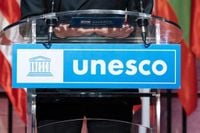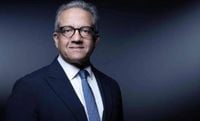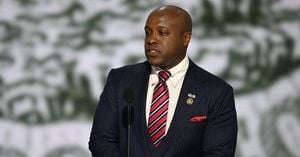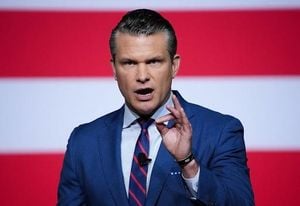UNESCO, the United Nations’ cultural, scientific, and educational agency, is poised to enter a new era as it prepares to welcome its first-ever Arab director-general. On Monday, October 6, 2025, the agency’s executive board nominated Dr. Khaled el-Anani, a distinguished Egyptologist and Egypt’s former minister of tourism and antiquities, for the top post. His nomination, which is expected to be confirmed at UNESCO’s general assembly in Uzbekistan this November, marks a historic milestone for Arab representation in international organizations and comes at a critical juncture for UNESCO, which faces significant financial and political challenges following the recent withdrawal of the United States.
Dr. el-Anani’s nomination was anything but a close call. According to multiple reports, including ALBAWABA and AFP, he secured 55 out of 58 votes from the executive board, with only two votes going to his sole challenger, Congolese economist Firmin Edouard Matoko, and one member abstaining. The board, representing 58 of UNESCO’s 194 member states, overwhelmingly backed el-Anani, whose campaign was supported by both the Arab League and the African Union. This landslide victory has been described as a “landmark victory after 80 years,” reflecting growing recognition of Arab contributions to global culture, science, and education.
The significance of this election is not lost on observers or stakeholders. Egyptian President Abdel Fattah el-Sissi hailed the nomination as a “historic achievement that shall be added to Egypt’s diplomatic and cultural record and to the achievements of the Arab and African peoples.” Egyptian Foreign Minister Badr Abdelatty, speaking in Paris, echoed these sentiments, stating, “How come a country like Egypt, with its long history, with layers of Pharaonic, Greek, Roman, Coptic, Arab, Islamic civilisation, has not led this important organisation? This is not acceptable at all.”
Dr. el-Anani, 54, brings a unique blend of academic expertise and practical experience to the role. Before entering government, he worked as a tour guide at ancient Egyptian sites and earned his doctorate in France. He later became a professor of Egyptology at a public university in Cairo. His tenure as Egypt’s minister of antiquities from 2016 to 2019, and subsequently as minister of tourism and antiquities for two years after the two portfolios were merged, was marked by ambitious projects. Notably, he oversaw the launch of the National Museum of Egyptian Civilization in Cairo and championed the restoration of numerous ancient sites, including the Jewish Temple and other archaeological treasures, helping to revive Egypt’s battered tourism sector.
El-Anani’s candidacy was not without its critics. Conservationists within Egypt have accused his ministry of failing to adequately protect sensitive heritage sites in Cairo and the Sinai Peninsula. Nevertheless, his supporters argue that his lack of direct United Nations experience may actually be an asset, allowing him to approach the organization’s entrenched problems with fresh eyes and a reformist spirit.
UNESCO, founded in the aftermath of World War II, is best known for designating and safeguarding World Heritage sites—ranging from the Galapagos Islands to the tombs of Timbuktu. But its mission extends far beyond tourism and archaeology. The Paris-based agency works to promote international cooperation in education, science, culture, and communication. It champions causes such as girls’ education, Holocaust awareness, and scientific research in developing countries. Outgoing Director-General Audrey Azoulay, who completed the maximum two four-year terms, led efforts to rebuild the ancient Iraqi city of Mosul after its devastation by ISIS and steered the organization through a period focused on digital transformation and heritage protection.
Yet, UNESCO has also long faced accusations of mismanagement and waste. The recent decision by the Trump administration to withdraw the United States from the agency—a move justified by claims of politicization and anti-Israel bias—has left UNESCO staring down a significant budget shortfall. Washington currently provides about 8% of UNESCO’s funding, a contribution that will disappear once the withdrawal takes full effect at the end of 2026. The White House, in its announcement, described UNESCO as supporting "woke, divisive cultural and social causes." Critics of the U.S. move, however, argue that it leaves the door open for countries like China to exert greater influence within the organization.
Both el-Anani and his challenger, Firmin Matoko—a UNESCO insider with decades of experience, including work in Rwanda after the genocide and educational initiatives in refugee camps—acknowledged the agency’s financial woes during their campaigns. They pledged to seek increased private sector funding to fill the gap left by departing donors and to pursue reforms aimed at making UNESCO more efficient and responsive to global challenges. El-Anani, in particular, has promised to focus on revitalizing UNESCO’s global role through enhanced cultural cooperation, the protection of heritage sites, and advancing equitable education worldwide. He has also vowed to continue UNESCO’s work fighting antisemitism and religious intolerance, and to make efforts to bring the United States back into the UNESCO fold.
Matoko, 69, emphasized a pragmatic approach, calling for “budgetary rigor” and readiness to cut jobs or programs if necessary. He also expressed a desire to move UNESCO away from political tensions and focus on technical solutions, highlighting his own experience training teachers in refugee camps and the long-term impact of UNESCO’s educational efforts.
The vote for director-general comes at a time of deepening divisions within the broader United Nations system, as conflicts in Gaza and Ukraine test the organization’s ability to foster international cooperation. The 80-year-old UNESCO, like many U.N. agencies, is grappling with the twin pressures of financial uncertainty and heightened geopolitical tensions. Supporters of UNESCO’s mission argue that, despite its flaws, the agency’s work in promoting peace through education, science, and culture remains as vital as ever.
As Dr. Khaled el-Anani prepares to take the helm in November 2025, expectations are high that his leadership will usher in a period of reform and renewal. Backed by strong regional alliances and a clear mandate from UNESCO’s executive board, he faces the daunting task of stabilizing the agency’s finances, rebuilding relationships with major donors, and ensuring that UNESCO continues to serve as a guardian of the world’s cultural and intellectual heritage. Whether he can bridge the divides and steer UNESCO through these turbulent times remains to be seen, but his appointment is already being hailed as a defining moment for Arab diplomacy and a new chapter in the agency’s storied history.






